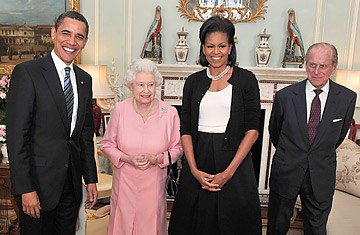
U.S. President Barack Obama and his wife Michelle pose with Britain's Queen Elizabeth II and Prince Philip
It was a meeting of hope and experience. President Obama, on whose elegant shoulders the expectations of not only his U.S. supporters but the wider world so lightly rest, held a morning press conference with British Prime Minister Gordon Brown, a grizzled political veteran and the first of Obama's hosts during his weeklong international tour. The press conference and a host of bilateral meetings and other gatherings have all been arranged for April Fools' Day — a quirk of scheduling imposed by the decision to hold a meeting of the G-20 on April 2, the only slot ahead of a two-day NATO summit, which the U.S. and other European leaders will also attend. But amid talk of a growing rift between continental Europeans on one side and the Anglo-American accord on the other, it seems that only an April Fool would believe there's any chance for tomorrow's meeting to produce a concrete plan to tackle the world's economic woes.
Yet somehow, out of a routine piece of choreography — two world leaders standing at adjoining lecterns — Obama conjured a sense of optimism about what the G-20 might achieve, and more broadly about America's changed view of its international role. He had come, he told an audience that included Secretary of State Hillary Clinton and Secretary of the Treasury Timothy Geithner, "to listen, not to lecture." The phrase had already been telegraphed by his press team, but it was no less powerful for that, especially to an audience used to his predecessor's homilies on American views and values. More startling, Obama said the U.S. was coming to the G-20 "as a peer" of the other nations. Dismissing speculation over rifts as exaggerated, the President maintained that there had been "an extraordinary convergence." (See pictures of Obama's family tree.)
But even as Obama spoke in the Locarno Room, a grand, gilded space in the Foreign and Commonwealth Office that was designed at the height of Britain's colonial powers, plans were afoot to challenge a stage-managed G-20 consensus. Demonstrators took to the streets, and French President Nicolas Sarkozy and German Chancellor Angela Merkel sent out invitations to their own joint London press conference, to signal their determination to resist any Anglo-American pressure for additional fiscal stimulus and to highlight their demands for stricter financial regulation. They are not the only G-20 leaders to arrive in London with agendas that reflect divergent approaches to the economic crisis — and differing domestic pressures. (See pictures of the global financial crisis.)
Obama told the press conference that he hoped his first meeting with Russia's President, Dimitri Medvedev, in the afternoon would address what Obama called "the drift in the U.S.-Russia relationship." "There are very real differences. I have no interest in papering these over," he said, adding that on the issue of nuclear nonproliferation, he saw one of the strongest areas of common ground.
Whether that reset button proves effective remains to be seen, but in his first international appearance since his election, Obama certainly reset White House relations with the famously cynical British press, many of whom surreptitiously took pictures and video on their cell phones as he spoke. He charmed them by giving real consideration to journalists' questions. He wouldn't say when he thought the hard times would end, but he urged sensible financial planning ("Basing decisions around fear is not the right way to go"). He also said he loved the Queen — he and the First Lady will meet the monarch ahead of a grand get-together at Buckingham Palace for all G-20 leaders on the eve of the summit. "Michelle has really been thinking [the royal meeting] through," he quipped. (See pictures of Michelle Obama's fashion.)
Obama even risked accepting the invitation of one British hack to give election advice to Prime Minister Brown, subverting the mischievous intent behind the question with a thoughtful response. "Over time, good policy is good politics," Obama said. Moreover, "you can wake up in the morning and look in the mirror." From a President only 73 days into his job to a politician who has served, respectively, as Chancellor and Prime Minister since 1997, such a response might have seemed presumptuous. Instead Brown smiled, apparently happy to bask in the reflected glow of Obama's optimism. Hope, as Obama continues to show, really can triumph over experience.
